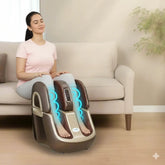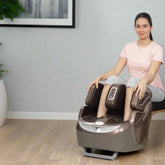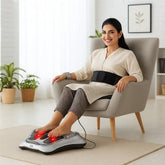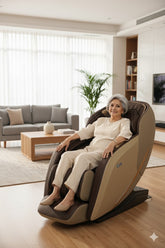Percussion massagers have gained popularity for their effectiveness in reducing muscle soreness, improving circulation, and enhancing overall recovery. Whether you're an athlete looking to speed up recovery or someone suffering from chronic muscle pain, understanding how to use a percussion massager correctly can significantly enhance its benefits. This article guides you through the steps of using a percussion massager and helps you choose the right model for your needs.
Understanding Percussion Massagers
Percussion massagers are handheld devices that deliver rapid bursts of pressure into the muscle tissue. This type of massage mimics the effects of deep tissue massage, which can be beneficial for loosening tight muscles, breaking up scar tissue, and minimizing muscle soreness.
How to Use a Percussion Massager
Using a percussion massager properly is crucial for achieving the best results and avoiding injury. Here’s how to use one effectively:
- Choose the Right Attachment: Most percussion massagers come with a variety of attachments for different uses, such as large ball heads for large muscle groups and pointed heads for trigger points. Choose the attachment that best suits the area you are targeting.
- Select the Appropriate Speed Setting: Start with the lowest setting to see how your body reacts and gradually increase the intensity as needed. Higher speeds are best for larger, denser muscles, while lower speeds are suitable for sensitive areas.
- Position the Massager: Hold the massager against your skin, perpendicular to the area you’re massaging. You don’t need to press hard; let the device do the work.
- Move Slowly Across the Muscle: Glide the massager slowly along the muscle. Avoid rapid back-and-forth movements. Spend extra time on knots and tight areas but avoid overworking a single spot.
- Limit Your Session: A typical massage session should last between 2 to 15 minutes per muscle group. Longer sessions may cause swelling or discomfort.
Choosing the Right Percussion Massager
When selecting a percussion massager, consider the following factors:
- Power and Speed: Look for a massager that offers a range of speeds and power settings to handle different muscle groups and pain thresholds.
- Attachments and Accessories: Consider models that come with multiple attachments to target different parts of the body effectively.
- Battery Life: Choose a massager with a long battery life, especially if you plan to use it frequently or for extended sessions.
- Ergonomics and Weight: Ensure the massager is comfortable to hold and not too heavy, as you might be using it for extended periods.
- Noise Level: Some massagers can be quite loud, so look for one that operates quietly if noise is a concern for you.
FAQs
Q: Can percussion massagers help with muscle recovery?
A: Yes, percussion massagers are excellent for muscle recovery. They enhance blood flow to the area, helping to reduce inflammation and muscle tension.
Q: Is it safe to use a percussion massager every day?
A: Yes, it is generally safe to use a percussion massager daily as long as you use it properly and don't exceed the recommended time on any muscle group.
Q: Can I use a percussion massager if I have a medical condition?
A: If you have a medical condition, particularly related to the bones, circulation, or skin, consult with a healthcare provider before using a percussion massager.
Q: How do I know if I'm using the percussion massager too much?
A: If you experience pain, bruising, or swelling, these might be signs that you are overusing the massager. Listen to your body and adjust accordingly.
Conclusion
Percussion massagers are powerful tools for alleviating muscle soreness and enhancing recovery. By choosing the right massager and using it correctly, you can maximize its benefits and enjoy a safer, more effective massage experience. Whether you're an athlete or someone dealing with chronic pain, a percussion massager can be a valuable addition to your wellness routine.










